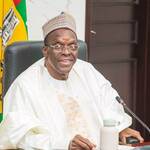National Chairman of the New Patriotic Party (NPP), Stephen Ayesu Ntim has reiterated that the party is totally against the activities of Lesbian, Gay, Bisexual, Transgender, and Queer (LGBTQI+) in the country.
He said the NPP’s tradition abhors such practice hence; the governing party will not endorse LGBTQI+.
He emphasized the NPP’s commitment to promoting Ghana’s long-standing values and traditions.
According to him, although the NPP is keen on protecting the rights of minorities in the country, activities of LGBTQI+ won’t be tolerated.
Mr. Ntim reiterated the position of the party at a thanksgiving service to commemorate the one year anniversary since the election of new National Executives.
“We in the NPP are opposed to any systematic attempt to normalize LGBTQ+ and related conduct acts in Ghana because it is not part of the legacy.
“As a center-right party, the NPP stands firmly against any erosion of the values that have shaped Ghanaian society for generations.
“Our society has its core values and principles that make us who we are, and we must embrace them with pride. Let us be vigilant against any forces that seek to undermine our heritage,” he said.
Mr. Ntim further underlined that while the NPP is dedicated to addressing pressing issues affecting Ghanaians across the nation, the LGBTQI+ agenda is not among their priorities.
Instead, he urged Ghanaians, particularly the youth, to take pride in their cultural identity and remain vigilant against forces that seek to undermine their heritage.
Warning to NDC
While calling for unity in upholding Ghana’s cherished cultural values, the NPP National Chairman called on the opposition National Democratic Congress (NDC) to respect the NPP’s stance on LGBTQI+ issues.
He cautioned against what he referred to as a “cynical campaign” by the NDC to impose the LGBTQI+ agenda on the NPP, urging the opposition to engage constructively on matters that genuinely impact the nation’s progress and welfare.
Mr. Ntim rallied the party’s base to support the NPP’s position on the matter and set the party’s course in preserving the country’s cultural heritage and societal values.
The thanksgiving service, attended by diverse audience comprising of the clergy, traditional leaders, and moral leaders served as a significant occasion for the NPP’s National Executives to come together and reflect on their first year in office. Also in attendance were party members and loyal supporters.
Anti- LGBTQI+ Bill
The Promotion of Proper Human Sexual Rights and Ghanaian Family Values Bill, 2021 which was introduced to the House in July 2021 has been unanimously adopted by Members of Parliament (MPs).
The proposed legislation which aims to provide for proper human sexual rights and Ghanaian family values seeks to restrict LGBTQI+ communities and any activities related to them.
The new Bill would go much further, criminalising the promotion and funding of LGBTQ+ activities as well as public displays of affection, cross-dressing and more, while campaigning for LGBTQ+ persons on social media or online platforms is also prohibited under the Bill.
The Bill further seeks to provide for protection of and support for children, persons who are victims or accused of LBBTTQQIAAP+ and related activities and other persons and related matters while people advocating the rights of these sexual minorities will also be penalized.
Proponents of the Bill want the promotion, advocacy, funding, and acts of homosexuality to be criminalized in the country saying it is a world-class piece of legislation which should be a reference material for other Parliaments seeking to pass similar legislation.
The memorandum accompanying the Bill said the object of the Bill is to provide for proper human sexual rights and Ghanaian family values, proscribe LGBTQ+ and related activities, propaganda of, advocacy for or promotion of LGBTTQQIAAP+ and related activities.
The Member of Parliament for Ningo-Prampram Constituency, Sam George, who led the proponents in championing the passage of the Bill into law, presumed it is a landmark legislation that has taken a fantastic team of professionals to put together.
Other MPs that joined in presenting the Bill include, Emmanuel Bedzrah (Ho West) Della Adjoa Sowah (Kpando), John Ntim Fordjour (Assin South), Alhassan Sayibu Suhuyini (Tamale North), Helen Adjoa Ntoso (Krachi West), Rita Naa Odoley Sowah (La Dadekotopon) and Rockson Nelson Dafeamekpor (South Dayi).
71 countries have laws against LGBTQI
Many of the world’s 71 countries with anti-LGBTQI+ laws have Muslim majorities, slightly more than the numbers that are majority-Christian.
Of the total, 49% representing 35 countries have a Muslim majority. Majority-Christian countries account for 44% of the total making 31 countries.
Some five countries have almost parity in Muslim and Christian population.
The number of Christian-majority nations with anti-homosexuality laws has shrunk in recent years, both through court rulings (Trinidad in 2018, Belize in 2016) and through legislative action (Angola and Botswana in 2019, Seychelles and Nauru in 2016, Mozambique, São Tomé and Príncipe, and Palau in 2014).
Similar laws have been dropped in Hindu-majority India (2018) and in Buddhist-majority Bhutan (2021).
Meanwhile, no Muslim-majority nation has repealed an anti-LGBT law.
Muslim majority countries
The Muslim majority countries include Afghanistan, Algeria, Bangladesh, Brunei, Chad, Comoros, Egypt, Eritrea, Ethiopia, 10 Gambia, Indonesia (Aceh Province and South Sumatra only), Iran, Iraq, Kuwait, Lebanon (law ruled invalid in one court in 2014 and disqualified for use against same-sex intimacy in another court in 2017) and Libya.
Others the rest are Malaysia, Maldives, Mauritania, Morocco, Oman, Pakistan, Palestine/Gaza Strip — lacking broad international recognition as a country, Qatar, Saudi Arabia, Senegal, Somalia, South Sudan, Sudan, Syria, Tunisia, Turkmenistan, United Arab Emirates, Uzbekistan and Yemen
Christian majority countries
The Christian majority countries include Antigua & Barbuda, Barbados, Burundi, Cameroon, Cook Islands, Dominica (But see “Dominica leader: No enforcement of anti-gay law” ), Ghana, Grenada, Guinea, Guyana, Jamaica, Kenya, Kiribati, Liberia, Malawi (enforcement of law allegedly suspended), Namibia and Papua New Guinea.
The rest are, Samoa, Solomon Islands, Sierra Leone, St. Kitts & Nevis, St. Lucia, St Vincent & the Grenadines, Swaziland / Eswatini, Tanzania, Togo, Tonga, Tuvalu, Uganda, Zambia and Zimbabwe
Countries where population is almost equally divided includes Mauritius, Myanmar, Nigeria — roughly 50-50 Christian-Muslim, Singapore and Sri Lanka.




